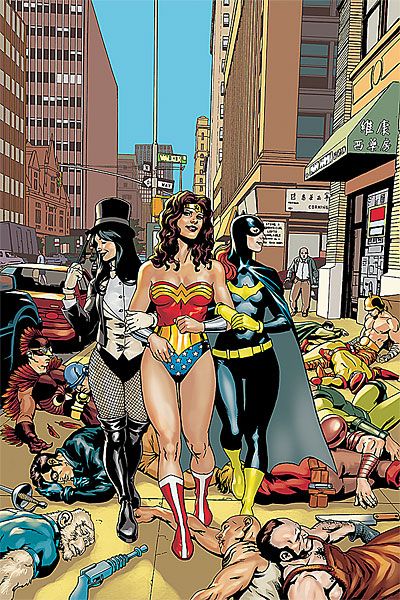This is simply an amazing-looking comic book. I say "simply," but that's because Cliff Chiang makes the beauty look so effortless. He draws gorgeous versions of Batgirl, Zatanna, and Wonder Woman in costume and in their night-on-the-town clothes. And he is a master of expressive body language. He gives us a keen sense of place, and we feel that these characters inhabit a real world -- or a well-defined fantasy corner of the DCU, where superheroines go out dancing and eat pancakes at an all-nite diner after an evening of fun.
Trish Mulvihill's colors accentuate Chiang's linework perfectly. She makes everything look appropriately radiant without being garish, and she provides just the right amount of shading without excessively modeling the three-dimensionality of the characters. Chiang's style is a bold, clean one, and so is Mulvihill's.
The Jesus Saiz cover doesn't come close to doing justice to what is inside these pages.
I could talk about the art in this issue all day. It's certainly one of the best-looking DC comics of the year, and it makes this issue worthy of notice.
Because the story? That's a problem.
J. Michael Straczynski gives us a "Ladies' Night" that's occasionally charming but mostly just tacky. Unlike Cliff Chiang and Trish Mulvihill's art, Straczynski's story is gaudy and showy and in poor taste. It's not just that he decided to tell this particular story about this particular life-changing night for these characters, it's that he does it in such an obvious an overbearing way. And although I don't tend to review comics based on my assumptions about what fictional characters would or wouldn't do, the actions of Zatanna and Wonder Woman in this issue seem contrary to everything we know about them. This seems like a story built around what Straczynski may have assumed was a clever concept, but it's not. It's just weirdly sadistic.
This is the story -- and I'm going to spoil the "twist" ending, even though it's not much of a surprise and it's overly telegraphed throughout the story -- about the last night before Barbara Gordon took a bullet to the spine from Joker and became paralyzed. And what do her pals Zatanna and Wonder Woman do when Zatanna gets a convenient and yet mysterious vision that this will happen? They take Batgirl dancing. They give her a night to remember so, I guess, she'll really remember how much she misses the use of her legs the next day. And Wonder Woman, in particular, takes the time to talk seriously to Batgirl about how hard it is to know stuff that you can't change, and she helpfully provides the Spark Notes version of the Oracle at Delphi. You know, because Barbara Gordon becomes known as Oracle later. Clever, right? Not so much.
It's bad enough that Zatanna and Wonder Woman give up so easily and resign themselves to the knowledge that Barbara Gordon will be shot in the spine and they won't be able to stop it (which really doesn't make sense for characters who have been repeatedly shown to defy the whims of fate time and time again), but the obviousness of the storytelling, and the, as I said before, tacky nature of the way the story is told, well, it doesn't give Cliff Chiang and Trish Mulvihill the narrative they deserve.

